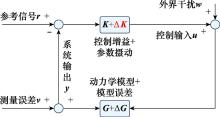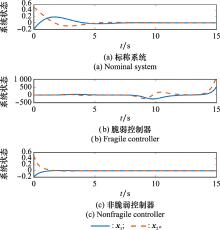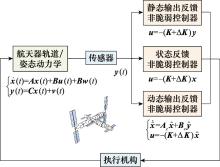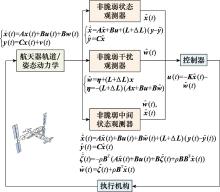Systems Engineering and Electronics ›› 2025, Vol. 47 ›› Issue (5): 1638-1645.doi: 10.12305/j.issn.1001-506X.2025.05.25
• Guidance, Navigation and Control • Previous Articles
Advances in theory and application of spacecraft non-fragile control
Bailiang LYU1,2, Chuang LIU1,2,*, Xiaokui YUE1,2
- 1. School of Astronautics, Northwestern Polytechnical University, Xi'an 710072, China
2. National Key Laboratory of Aerospace Flight Dynamics, Northwestern Polytechnical University, Xi'an 710072, China
-
Received:2024-05-28Online:2025-06-11Published:2025-06-18 -
Contact:Chuang LIU
CLC Number:
Cite this article
Bailiang LYU, Chuang LIU, Xiaokui YUE. Advances in theory and application of spacecraft non-fragile control[J]. Systems Engineering and Electronics, 2025, 47(5): 1638-1645.
share this article
| 1 | 曹登庆, 白坤朝, 丁虎, 等. 大型柔性航天器动力学与振动控制研究进展[J]. 力学学报, 2019, 51 (1): 1- 13. |
| CAO D Q , BAI K C , DING H , et al. Advances in dynamics and vibration control of large-scale flexible spacecraft[J]. Chinese Journal of Theoretical and Applied Mechanics, 2019, 51 (1): 1- 13. | |
| 2 |
刘聪, 李海锋, 王明明, 等. 空间桁架在轨装配机器人的运动规划方法[J]. 系统工程与电子技术, 2024, 46 (2): 715- 721.
doi: 10.12305/j.issn.1001-506X.2024.02.35 |
|
LIU C , LI H F , WANG M M , et al. Robot motion planning method for space truss on-orbit assembly[J]. System Engineering and Electronics, 2024, 46 (2): 715- 721.
doi: 10.12305/j.issn.1001-506X.2024.02.35 |
|
| 3 |
LIU C , MA Y Q , YUE X K , et al. Improved sliding mode tracking control for spacecraft electromagnetic separation supporting on-orbit assembly[J]. Advances in Space Research, 2024, 73 (9): 4711- 4720.
doi: 10.1016/j.asr.2024.01.034 |
| 4 |
胡越欣, 张立华, 高永, 等. 空间引力波探测航天器关键技术分析[J]. 航天器工程, 2022, 31 (4): 1- 7.
doi: 10.3969/j.issn.1673-8748.2022.04.001 |
|
HU Y X , ZHANG L H , GAO Y , et al. Analysis of key tech nologies of spacecraft for gravitational waves detection in space[J]. Spacecraft Engineering, 2022, 31 (4): 1- 7.
doi: 10.3969/j.issn.1673-8748.2022.04.001 |
|
| 5 | 郑永洁, 王泽国. 嫦娥五号探测器GNC系统设计[J]. 空间控制技术与应用, 2021, 47 (5): 68- 74. |
| ZHENG Y J , WANG Z G . Chang'E-5 guidance, navigation, and control system design[J]. Aerospace Control and Application, 2021, 47 (5): 68- 74. | |
| 6 | 赵宇, 王晓磊, 黄翔宇, 等. 天问一号火星软着陆制导、导航与控制系统[J]. 空间控制技术与应用, 2021, 47 (5): 48- 57. |
| ZHAO Y , WANG X L , HUANG X Y , et al. Tianwen-1 lander guidance navigation and control system for Mars soft landing[J]. Aerospace Control and Application, 2021, 47 (5): 48- 57. | |
| 7 | 袁利, 姜甜甜, 魏春岭, 等. 空间控制技术发展与展望[J]. 自动化学报, 2023, 49 (3): 476- 493. |
| YUAN L , JIANG T T , WEI C L , et al. Advances and perspectives of space control technology[J]. Acta Automatica Sinica, 2023, 49 (3): 476- 493. | |
| 8 | 胡庆雷, 邵小东, 杨昊旸, 等. 航天器多约束姿态规划与控制: 进展与展望[J]. 航空学报, 2022, 43 (10): 403- 431. |
| HU Q L , SHAO X D , YANG H Y , et al. Spacecraft attitude planning and control under multiple constraints: review and prospects[J]. Acta Aeronautica et Astronautica Sinica, 2022, 43 (10): 403- 431. | |
| 9 |
HAO Z W , YUE X K , WEN H W , et al. Full-state-constrained non-certainty-equivalent adaptive control for satellite swarm subject to input fault[J]. IEEE/CAA Journal of Automatica Sinica, 2022, 9 (3): 482- 495.
doi: 10.1109/JAS.2021.1004216 |
| 10 |
柯晓曼, 吴云华, 郑墨泓, 等. 基于改进迭代学习的参数不确定卫星姿态控制[J]. 系统工程与电子技术, 2021, 43 (2): 508- 518.
doi: 10.12305/j.issn.1001-506X.2021.02.25 |
|
KE X M , WU Y H , ZHENG M H , et al. Attitude control for spacecraft with uncertain parameters based on improved iterative learning[J]. Systems Engineering and Electronics, 2021, 43 (2): 508- 518.
doi: 10.12305/j.issn.1001-506X.2021.02.25 |
|
| 11 |
REN J J , TANG S , CHEN T . Adaptive sliding mode control of spacecraft attitude-orbit dynamics on SE(3)[J]. Advances in Space Research, 2023, 71 (1): 525- 538.
doi: 10.1016/j.asr.2022.09.007 |
| 12 |
GAO H , XIA Y Q , ZHANG J H , et al. Finite-time fault-tolerant output feedback attitude control of spacecraft formation with guaranteed performance[J]. International Journal of Robust and Nonlinear Control, 2021, 31 (10): 4664- 4688.
doi: 10.1002/rnc.5504 |
| 13 |
NAJAFIZADEH S N , JAHANSHAHI H , FAKOOR M . Adaptive fuzzy PID control strategy for spacecraft attitude control[J]. International Journal of Fuzzy Systems, 2019, 21, 769- 781.
doi: 10.1007/s40815-018-0576-2 |
| 14 | YANG C , XIA Y Q . Interval uncertainty-oriented optimal control method for spacecraft attitude control[J]. IEEE Trans.on Aerospace and Electronic Systems, 2023, 59 (5): 5460- 5471. |
| 15 |
LYU B L , YUE X K , LIU C . Constrained multi-observer-based fault-tolerant disturbance-rejection control for rigid spacecraft[J]. International Journal of Robust and Nonlinear Control, 2022, 32 (14): 8102- 8133.
doi: 10.1002/rnc.6270 |
| 16 |
LIU C , YUE X K , ZHANG J Q , et al. Active disturbance rejection control for delayed electromagnetic docking of spacecraft in elliptical orbits[J]. IEEE Trans.on Aerospace and Electronic Systems, 2022, 58 (3): 2257- 2268.
doi: 10.1109/TAES.2021.3130830 |
| 17 |
KEEL L H , BHATTACHARYYA S P . Robust, fragile, or optimal?[J]. IEEE Trans.on Automatic Control, 1997, 42 (8): 1098- 1105.
doi: 10.1109/9.618239 |
| 18 | 何朕, 饶丹, 王广雄, 等. 控制系统的脆弱性与鲁棒性[J]. 电机与控制学报, 2011, 15 (4): 80- 84. |
| HE Z , RAO D , WANG G X , et al. Fragility and robustness of the control system[J]. Electric Machines and Control, 2011, 15 (4): 80- 84. | |
| 19 | DORATO P. Non-fragile controller design: an overview[C]//Proc. of the American Control Conference, 1998: 2829-2831. |
| 20 | JADBABAIE A, ABDALLAH C T, FAMULARO D, et al. Robust, non-fragile and optimal controller design via linear matrix inequalities[C]//Proc. of the American Control Confe-rence, 1998: 2842-2846. |
| 21 | GAHINET P, NEMIROVSKII A, LAUB A J, et al. The LMI control toolbox[C]//Proc. of the IEEE 33rd Conference On Decision and Control, 1994: 2038-2041. |
| 22 | BALAS G J, PACKARD A K, SAFONOV M G, et al. Next generation of tools for robust control[C]//Proc. of the American Control Conference, 2004: 5612-5615. |
| 23 |
FAMULARO D , DORATO P , ABDALLAH C T , et al. Ro bust non-fragile LQ controllers: the static state feedback case[J]. International Journal of Control, 2000, 73 (2): 159- 165.
doi: 10.1080/002071700219867 |
| 24 |
YANG G H , WANG J L . Non-fragile H∞ control for linear systems with multiplicative controller gain variations[J]. Automatica, 2001, 37 (5): 727- 737.
doi: 10.1016/S0005-1098(01)00008-5 |
| 25 | DU H P , LAM J , SZE K Y . Non-fragile H∞ vibration control for uncertain structural systems[J]. Journal of Sound and Vibration, 2004, 273 (4/5): 1031- 1045. |
| 26 | XU S Y , LAM J , WANG J L , et al. Non-fragile positive real control for uncertain linear neutral delay systems[J]. Systems & Control Letters, 2004, 52 (1): 59- 74. |
| 27 | ZHANG B Y , ZHOU S S , LI T . A new approach to robust and non-fragile H∞ control for uncertain fuzzy systems[J]. Information Sciences, 2007, 177 (22): 5118- 5133. |
| 28 | PENG X J , HE Y . Consensus of multi-agent systems with state and input delays via non-fragile protocol[J]. International Journal of Systems Science, 2022, 53 (12): 2584- 2596. |
| 29 | DING K , ZHU Q X , LI H D . A generalized system approach to intermittent nonfragile control of stochastic neutral time-vary- ing delay systems[J]. IEEE Trans.on Systems, Man, and Cybernetics: Systems, 2020, 51 (11): 7017- 7026. |
| 30 | ZHANG J H , SHI P , QIU J Q . Non-fragile guaranteed cost control for uncertain stochastic nonlinear time-delay systems[J]. Journal of the Franklin Institute, 2009, 346 (7): 676- 690. |
| 31 | LI F B , SHI P , WU L G , et al. Fuzzy-model-based D-stability and nonfragile control for discrete-time descriptor systems with multiple delays[J]. IEEE Trans.on Fuzzy Systems, 2013, 22 (4): 1019- 1025. |
| 32 | KAVIKUMAR R , SAKTHIVEL R , KAVIARASAN B , et al. Non-fragile control design for interval-valued fuzzy systems against nonlinear actuator faults[J]. Fuzzy Sets and Systems, 2019, 365, 40- 59. |
| 33 | SHEN H , LI F , WU Z G , et al. Fuzzy-model-based nonfragile control for nonlinear singularly perturbed systems with semi-Markov jump parameters[J]. IEEE Trans.on Fuzzy systems, 2018, 26 (6): 3428- 3439. |
| 34 | ZHANG Y , TANG G Y , HU N P . Non-fragile control for nonlinear networked control systems with long time-delay[J]. Computers & Mathematics with Applications, 2009, 57 (10): 1630- 1637. |
| 35 | CHEN L P , LI T T , WU R C , et al. Non-fragile control for a class of fractional-order uncertain linear systems with time-delay[J]. IET Control Theory & Applications, 2020, 14 (12): 1575- 1589. |
| 36 | ANAND S , DEV A , SARKAR M K , et al. Non-fragile approach for frequency regulation in power system with event-triggered control and communication delays[J]. IEEE Trans.on Industry Applications, 2021, 57 (3): 2187- 2201. |
| 37 | SAKTHIVEL R , PARIVALLAL A , HUY T N , et al. Nonfragile control design for consensus of semi-Markov jumping multiagent systems with disturbances[J]. International Journal of Adaptive Control and Signal Processing, 2021, 35 (6): 1039- 1061. |
| 38 | WU Y Q , SU H Y , LU R Q , et al. Passivity-based non-fragile control for Markovian jump systems with aperiodic sampling[J]. Systems & Control Letters, 2015, 84, 35- 43. |
| 39 | YANG H Y , ZHANG J F , JIA X L , et al. Non-fragile control of positive Markovian jump systems[J]. Journal of the Franklin Institute, 2019, 356 (5): 2742- 2758. |
| 40 | SAKTHIVEL R , KANAKALAKSHMI S , KAVIARASAN B , et al. Finite-time consensus of input delayed multi-agent sys tems via non-fragile controller subject to switching topology[J]. Neurocomputing, 2019, 325, 225- 233. |
| 41 | SAKTHIVEL R , SANTRA S , KAVIARASAN B , et al. Dissipative analysis for network-based singular systems with non-fragile controller and event-triggered sampling scheme[J]. Journal of the Franklin Institute, 2017, 354 (12): 4739- 4761. |
| 42 | 岳晓奎, 吕佰梁, 刘闯, 等. 基于神经网络干扰观测器的柔性航天器姿态稳定控制[J]. 上海航天(中英文), 2022, 39 (4): 58- 65. |
| YUE X K , LYU B L , LIU C , et al. Neural network distur-bance observer-based attitude control for flexible spacecrafts[J]. Aerospace Shanghai (Chinese & English), 2022, 39 (4): 58- 65. | |
| 43 | GAO X Y , TEO K L , DUAN G R . Non-fragile guaranteed cost control for robust spacecraft orbit transfer with small thrust[J]. IMA Journal of Mathematical Control and Information, 2011, 28 (4): 507- 524. |
| 44 | GAO X Y , TEO K L , DUAN G R . Non-fragile robust H∞ control for uncertain spacecraft rendezvous system with pole and input constraints[J]. International Journal of Control, 2012, 85 (7): 933- 941. |
| 45 | GAO X Y, ZHANG X, TAN J L. Non-fragile guaranteed cost control for spacecraft rendezvous[C]//Proc. of the 11th World Congress on Intelligent Control and Automation, 2014: 4402- 4407. |
| 46 | ZHANG K , DUAN G R . Robust H∞ dynamic output feedback control for spacecraft rendezvous with poles and input con straint[J]. International Journal of Systems Science, 2017, 48 (5): 1022- 1034. |
| 47 | LIU C , SUN Z W , SHI K K , et al. Robust dynamic output feedback control for attitude stabilization of spacecraft with nonlinear perturbations[J]. Aerospace Science and Technology, 2017, 64, 102- 121. |
| 48 | LIU C , SHI K K , YUE X K , et al. Inertia-free saturated output feedback attitude stabilization for uncertain spacecraft[J]. International Journal of Robust and Nonlinear Control, 2020, 30 (13): 5101- 5121. |
| 49 | LIU C , SHI K K , SUN Z W . Robust H∞ controller design for attitude stabilization of flexible spacecraft with input constraints[J]. Advances in Space Research, 2019, 63 (5): 1498- 1522. |
| 50 | KUMAR S V , RAJA R , ANTHONI S M , et al. Robust finite-time non-fragile sampled-data control for TS fuzzy flexible spacecraft model with stochastic actuator faults[J]. Applied Mathematics and Computation, 2018, 321, 483- 497. |
| 51 | LIU C , YUE X K , YANG Z Y . Are nonfragile controllers always better than fragile controllers in attitude control perfor-mance of post-capture flexible spacecraft?[J]. Aerospace Science and Technology, 2021, 118, 107053. |
| 52 | LI Y . Multi-objective non-fragile robust attitude control for flexible microsatellite close-proximity inspection[J]. IEEE Access, 2021, 9, 94251- 94261. |
| 53 | DING K , ZHU Q X . Reliable intermittent extended dissipative control for uncertain fuzzy flexible spacecraft systems with Bernoulli stochastic distribution[J]. IET Control Theory & Applications, 2021, 15 (7): 911- 925. |
| 54 | HAN T J , KIM H S . Disturbance observer-based nonfragile fuzzy tracking control of a spacecraft[J]. Advances in Space Research, 2023, 71 (9): 3600- 3612. |
| 55 | LYU B L , LIU C , YUE X K . Hybrid nonfragile intermediate observer-based TS fuzzy attitude control for flexible spacecraft with input saturation[J]. Aerospace Science and Technology, 2022, 128, 107753. |
| 56 | YANG Z Y , LIU C , YUE X K , et al. Non-fragile negative imaginary output feedback control for attitude stabilization of flexible spacecraft[J]. Acta Astronautica, 2023, 208, 296- 310. |
| 57 | LI Q J , DENG Z C . Coordinated orbit-attitude-vibration control of a Sun-facing solar power satellite[J]. Journal of Gui-dance, Control, and Dynamics, 2019, 42 (8): 1863- 1869. |
| 58 | LI W J , CHENG D Y , LIU X G , et al. On-orbit service (OOS) of spacecraft: a review of engineering developments[J]. Progress in Aerospace Sciences, 2019, 108, 32- 120. |
| 59 | SHI K K , LIU C , SUN Z W , et al. Coupled orbit-attitude dynamics and trajectory tracking control for spacecraft electromagnetic docking[J]. Applied Mathematical Modelling, 2022, 101, 553- 572. |
| 60 |
赵宏亮, 张元文, 杨乐平, 等. 空间目标远距离磁控方法及应用分析[J]. 系统工程与电子技术, 2024, 46 (1): 261- 270.
doi: 10.12305/j.issn.1001-506X.2024.01.30 |
|
ZHAO H L , ZHANG Y W , YANG L P , et al. Method and application analysis of remote magnetic controlling for space target[J]. Systems Engineering and Electronics, 2024, 46 (1): 261- 270.
doi: 10.12305/j.issn.1001-506X.2024.01.30 |
|
| 61 | TIPALDI M , IERVOLINO R , MASSENIO P R . Reinforcement learning in spacecraft control applications: advances, prospects, and challenges[J]. Annual Reviews in Control, 2022, 54, 1- 23. |
| 62 | WEI C S , XIONG Y W , CHEN Q F , et al. On adaptive attitude tracking control of spacecraft: a reinforcement learning based gain tuning way with guaranteed performance[J]. Advances in Space Research, 2023, 71 (11): 4534- 4548. |
| [1] | Sheng GAO, Guangfu MA, Yanning GUO. Fast reconstruction of multiple faults based on adaptive unknown input observer [J]. Systems Engineering and Electronics, 2022, 44(7): 2364-2373. |
| [2] | GUO Zhiyuan, YAO Xiaoxian, ZHANG Xin. Fixed-structure controller design for rockets based on robust gain scheduling [J]. Systems Engineering and Electronics, 2018, 40(3): 615-622. |
| [3] | ZHU Wei, MA Weiming, YANG Xidang, XIAO Huan. Tracking control of ship borne quad-roto UAV based on robust fault diagnosis LPV model [J]. Systems Engineering and Electronics, 2018, 40(11): 2540-. |
| [4] | CHEN Cheng, WEI Changzhu, JU Xiaozhe, LIU Pengyun. Robust dynamic inversion control for quad-rotors unmanned vehicle based on sliding mode disturbance observation and compensation [J]. Systems Engineering and Electronics, 2018, 40(1): 119-126. |
| [5] | SONG Jiangpeng, ZHOU Di, SUN Guangli. Adaptive robust control for mirror platform based on extended state observer [J]. Systems Engineering and Electronics, 2017, 39(4): 876-882. |
| [6] | ZHAO Shunli1, YIN Xunhe1, WEI Xueye1, LAM Hakkeung2. Design of modelbased networked control system:average#br# dwell time approach to switched control [J]. Systems Engineering and Electronics, 2016, 38(8): 1899-1908. |
| [7] | ZHANG Yin-hui, YANG Hua-bo, JIANG Zhen-yu, ZHANG Wei-hua. Robust control of hypersonic flight vehicle based on disturbance estimation [J]. Systems Engineering and Electronics, 2016, 38(4): 875-881. |
| [8] | ZHANG Ying-chun, JIA Qing-xian, LI Hua-yi, GENG Yun-hai. Robust fault reconstruction design for satellite attitude control #br# systems based on proportional integral observer [J]. Systems Engineering and Electronics, 2014, 36(9): 1810-1818. |
| [9] | WANG Qing, WANG Tong, HOU De-long, DONG Chao-yang. Robust LPV control for morphing vehicles via velocity based linearization [J]. Systems Engineering and Electronics, 2014, 36(6): 1130-1136. |
| [10] | HU Jianbo, LI Fei, WEI Gaole, GAO Peng, WANG Qiang. Theory and applications of backstepping sliding mode variable structure control for uncertain systems [J]. Systems Engineering and Electronics, 2014, 36(3): 519-526. |
| [11] | XIAO Le, SAN Ye, ZHU Yi. Delay-dependent robust stabilization by states feedback for linear systems with uncertainties [J]. Journal of Systems Engineering and Electronics, 2013, 35(4): 802-806. |
| [12] | YANG Kun, SHEN Yan-xia, JI Zhi-cheng. Uniform finitetime stability for a class of uncertain discrete time switched singular systems [J]. Journal of Systems Engineering and Electronics, 2013, 35(2): 373-376. |
| [13] | XU Fei1,2, LIU Ming-yong1, LI Wen-bai1, LEI Xiao-kang1. Research on digital redesign of the robust controller for parametric uncertain systems [J]. Journal of Systems Engineering and Electronics, 2013, 35(1): 156-160. |
| [14] | WANG Zhenhua, SHEN Yi, ZHANG Xiaolei, WANG Qiang. Robust H∞ filter for uncertain linear descriptor systems [J]. Journal of Systems Engineering and Electronics, 2012, 34(9): 1878-1883. |
| [15] | WU Li-na,ZHANG Ying-chun,JIA Qing-xian,CHEN Xue-qin. LMI approach to H_/H∞fault detection observer design [J]. Journal of Systems Engineering and Electronics, 2012, 34(8): 1675-1679. |
| Viewed | ||||||
|
Full text |
|
|||||
|
Abstract |
|
|||||







